-
 Bitcoin
Bitcoin $84,503.0396
-0.26% -
 Ethereum
Ethereum $1,639.9033
1.40% -
 Tether USDt
Tether USDt $0.9998
0.00% -
 XRP
XRP $2.1454
-0.96% -
 BNB
BNB $584.9227
-0.39% -
 Solana
Solana $129.5837
-1.10% -
 USDC
USDC $1.0000
0.02% -
 TRON
TRON $0.2530
0.06% -
 Dogecoin
Dogecoin $0.1604
-3.16% -
 Cardano
Cardano $0.6380
-2.76% -
 UNUS SED LEO
UNUS SED LEO $9.3916
0.76% -
 Chainlink
Chainlink $12.8718
-0.80% -
 Avalanche
Avalanche $20.3150
0.41% -
 Stellar
Stellar $0.2404
-2.02% -
 Sui
Sui $2.2089
-3.82% -
 Shiba Inu
Shiba Inu $0.0...01218
-0.81% -
 Toncoin
Toncoin $2.8401
-1.67% -
 Hedera
Hedera $0.1647
-2.59% -
 Bitcoin Cash
Bitcoin Cash $326.8464
-5.81% -
 Polkadot
Polkadot $3.7405
-0.20% -
 Litecoin
Litecoin $76.9266
-2.88% -
 Dai
Dai $1.0001
-0.01% -
 Hyperliquid
Hyperliquid $15.5994
-1.02% -
 Bitget Token
Bitget Token $4.2932
-0.63% -
 Pi
Pi $0.7411
-0.92% -
 Ethena USDe
Ethena USDe $0.9990
0.00% -
 Monero
Monero $216.0000
4.11% -
 Uniswap
Uniswap $5.4278
-0.64% -
 OKB
OKB $53.3284
-0.96% -
 Pepe
Pepe $0.0...07401
0.70%
How does smart contract technology in the NFT market affect prices?
Smart contracts enhance NFT market transparency, enable royalties, and manage scarcity, significantly influencing NFT prices through automation and security.
Apr 11, 2025 at 06:29 am
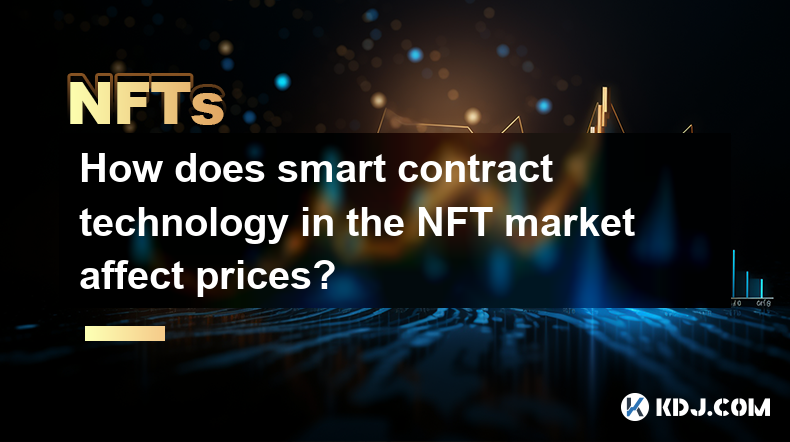
Smart contract technology plays a pivotal role in the Non-Fungible Token (NFT) market, influencing prices through various mechanisms. By automating transactions and enforcing predefined rules, smart contracts enhance transparency and security, which can impact how NFTs are valued. This technology ensures that the ownership and transfer of NFTs are managed efficiently and securely, which in turn can affect the market dynamics and pricing. The integration of smart contracts in NFTs not only streamlines the buying and selling process but also introduces new possibilities for creators and buyers, thereby affecting the overall price trends.
Transparency and Trust
Smart contracts contribute significantly to the transparency and trust in the NFT market. By executing transactions automatically and according to pre-agreed terms, smart contracts eliminate the need for intermediaries, reducing the risk of fraud and manipulation. This increased trust can lead to higher demand for NFTs, which often results in higher prices. When buyers feel confident that they are purchasing authentic and verifiable assets, they are more likely to invest in them, thereby driving up the value.
Royalties and Revenue Streams
One of the key features of smart contracts in NFTs is the ability to embed royalties directly into the token. This means that creators can receive a percentage of sales every time their NFT is resold. This feature can influence prices in several ways. Firstly, it provides a continuous revenue stream for creators, which can increase the perceived value of their NFTs. Secondly, knowing that creators will benefit from future sales can encourage buyers to invest in NFTs, anticipating that the value will appreciate over time.
Scarcity and Exclusivity
Smart contracts can be programmed to enforce scarcity and exclusivity, which are crucial factors in determining NFT prices. By setting limits on the number of NFTs that can be minted, smart contracts create a sense of rarity that can drive up demand and, consequently, prices. Additionally, smart contracts can be used to create time-limited editions or special releases, further enhancing the exclusivity and perceived value of the NFTs. This strategic use of scarcity can significantly impact how NFTs are priced in the market.
Automated Pricing Mechanisms
Some smart contracts incorporate automated pricing mechanisms that adjust the price of NFTs based on certain conditions. For instance, a smart contract might be programmed to increase the price of an NFT as its popularity grows or as certain milestones are reached. This dynamic pricing can lead to fluctuations in NFT prices, making them more responsive to market demand and other external factors. By allowing for real-time adjustments, smart contracts can help sellers maximize their returns and buyers find the best deals.
Fractional Ownership
Smart contracts enable fractional ownership of NFTs, allowing multiple buyers to own a piece of a single NFT. This can affect prices by making high-value NFTs more accessible to a broader audience. When an expensive NFT is divided into smaller, more affordable pieces, it can increase demand and liquidity in the market. As more people can participate in the ownership of an NFT, the overall market for that NFT can expand, potentially driving up its price. Fractional ownership through smart contracts thus plays a significant role in shaping NFT prices.
Marketplaces and Liquidity
Smart contracts are integral to the operation of NFT marketplaces, which provide platforms for buying and selling NFTs. These marketplaces rely on smart contracts to facilitate transactions securely and efficiently, which can influence liquidity and, consequently, prices. High liquidity in an NFT marketplace can lead to more competitive pricing and faster transactions, making NFTs more attractive to buyers and sellers. By enhancing the efficiency and accessibility of the market, smart contracts contribute to the overall pricing dynamics of NFTs.
Regulatory Compliance
Smart contracts can be designed to ensure regulatory compliance, which can impact NFT prices. By automating compliance checks and ensuring that transactions adhere to legal standards, smart contracts can reduce the risk associated with buying and selling NFTs. This increased security can boost investor confidence, leading to higher demand and potentially higher prices. Conversely, if smart contracts are not properly aligned with regulatory requirements, it could introduce risks that might depress prices. Therefore, the role of smart contracts in ensuring compliance is a critical factor in the NFT pricing landscape.
Programmable Features
The programmability of smart contracts allows for the creation of unique and innovative features within NFTs, which can influence their prices. For example, a smart contract might enable an NFT to change its appearance or unlock additional content based on certain conditions. These dynamic features can enhance the value of an NFT, making it more appealing to buyers and potentially driving up its price. By offering new and engaging experiences, smart contracts can differentiate NFTs in the market, affecting their perceived value and pricing.
Interoperability and Ecosystem Integration
Smart contracts facilitate interoperability and integration within the broader blockchain ecosystem, which can impact NFT prices. By allowing NFTs to be used across different platforms and applications, smart contracts can increase their utility and appeal. This increased functionality can lead to higher demand and, consequently, higher prices. For example, an NFT that can be used in multiple games or virtual worlds might be more valuable than one that is limited to a single platform. The ability of smart contracts to enhance the interoperability of NFTs plays a significant role in their pricing dynamics.
Auction Mechanisms
Smart contracts are often used to manage auction mechanisms for NFTs, which can directly influence their prices. By automating the auction process, smart contracts ensure that bids are processed fairly and transparently. This can lead to more competitive bidding and potentially higher final prices for NFTs. Additionally, smart contracts can be programmed to implement various auction formats, such as Dutch auctions or sealed-bid auctions, which can affect how NFTs are priced. The flexibility and efficiency of smart contracts in managing auctions contribute to the pricing dynamics of NFTs in the market.
Risk Management
Smart contracts can be used to manage risk in the NFT market, which can impact prices. For instance, smart contracts can be programmed to implement insurance mechanisms or escrow services that protect buyers and sellers from potential losses. By reducing the risk associated with transactions, smart contracts can increase trust and confidence in the market, leading to higher demand and potentially higher prices. Conversely, if smart contracts are not effective in managing risk, it could deter buyers and depress prices. Therefore, the role of smart contracts in risk management is a crucial factor in the pricing of NFTs.
Creator Control and Customization
Smart contracts provide creators with greater control and customization over their NFTs, which can influence prices. By allowing creators to set specific terms and conditions for their NFTs, smart contracts enable them to tailor their offerings to their target audience. This can increase the perceived value of the NFTs and attract buyers who are willing to pay a premium for unique and personalized assets. Additionally, smart contracts can be used to implement creative and innovative features that differentiate NFTs in the market, further affecting their pricing. The ability of smart contracts to empower creators plays a significant role in the pricing dynamics of NFTs.
Market Sentiment and Speculation
Smart contracts can influence market sentiment and speculation, which can have a direct impact on NFT prices. By providing a transparent and secure framework for transactions, smart contracts can enhance the overall perception of the NFT market, leading to increased speculation and investment. This can drive up demand and prices, especially for NFTs that are perceived as having high potential for appreciation. Conversely, if smart contracts are not effective in managing transactions or if there are concerns about their security, it could negatively impact market sentiment and depress prices. Therefore, the role of smart contracts in shaping market sentiment and speculation is a critical factor in NFT pricing.
Token Standards and Compatibility
Smart contracts are essential for implementing token standards and ensuring compatibility within the NFT ecosystem, which can affect prices. By adhering to established standards such as ERC-721 or ERC-1155, smart contracts ensure that NFTs can be seamlessly integrated and traded across different platforms. This compatibility can increase the liquidity and appeal of NFTs, leading to higher demand and potentially higher prices. Conversely, if smart contracts do not conform to widely accepted standards, it could limit the marketability of NFTs and depress their prices. Therefore, the role of smart contracts in ensuring token standards and compatibility is a crucial factor in the pricing of NFTs.
Data and Analytics
Smart contracts can be used to collect and analyze data related to NFT transactions, which can influence prices. By providing insights into market trends, buyer behavior, and other relevant metrics, smart contracts can help buyers and sellers make more informed decisions. This increased transparency and understanding can lead to more efficient pricing and potentially higher values for NFTs. Additionally, smart contracts can be used to implement data-driven pricing strategies that adjust NFT prices based on real-time market conditions. The ability of smart contracts to leverage data and analytics plays a significant role in the pricing dynamics of NFTs.
Environmental Impact and Sustainability
Smart contracts can also influence NFT prices through their environmental impact and sustainability. By optimizing the efficiency of transactions and reducing the need for energy-intensive processes, smart contracts can contribute to more sustainable practices in the NFT market. This can enhance the appeal of NFTs to environmentally conscious buyers, potentially driving up demand and prices. Conversely, if smart contracts are perceived as contributing to environmental issues, it could negatively impact market sentiment and depress prices. Therefore, the role of smart contracts in promoting sustainability is a critical factor in the pricing of NFTs.
Legal and Ethical Considerations
Smart contracts can affect NFT prices through their impact on legal and ethical considerations. By ensuring that transactions are conducted in compliance with legal standards and ethical norms, smart contracts can enhance the legitimacy and appeal of NFTs. This can increase buyer confidence and demand, potentially driving up prices. Conversely, if smart contracts are associated with legal or ethical issues, it could deter buyers and depress prices. Therefore, the role of smart contracts in addressing legal and ethical considerations is a crucial factor in the pricing of NFTs.
Community and Social Dynamics
Smart contracts can influence NFT prices through their impact on community and social dynamics. By facilitating the creation and management of decentralized communities around NFTs, smart contracts can enhance the sense of belonging and engagement among buyers and creators. This can increase the perceived value of NFTs and drive up demand and prices. Additionally, smart contracts can be used to implement social features that encourage interaction and collaboration within the NFT community, further enhancing their appeal. Therefore, the role of smart contracts in shaping community and social dynamics is a significant factor in the pricing of NFTs.
Innovation and Future Potential
Smart contracts play a crucial role in driving innovation and future potential in the NFT market, which can influence prices. By enabling the creation of new and innovative NFT features and applications, smart contracts can increase the appeal and perceived value of NFTs. This can lead to higher demand and potentially higher prices, especially for NFTs that are seen as having significant future potential. Additionally, smart contracts can be used to implement forward-looking strategies that anticipate and capitalize on emerging trends in the NFT market, further affecting their pricing. Therefore, the role of smart contracts in driving innovation and future potential is a key factor in the pricing of NFTs.
FAQs
Q: How do smart contracts enhance transparency in the NFT market?
A: Smart contracts enhance transparency by automating transactions according to pre-agreed terms, eliminating the need for intermediaries and reducing the risk of fraud and manipulation. This increased trust can lead to higher demand and higher prices for NFTs.
Q: Can smart contracts affect NFT prices through royalties?
A: Yes, smart contracts can embed royalties into NFTs, allowing creators to receive a percentage of sales every time their NFT is resold. This can increase the perceived value of NFTs and drive up demand and prices.
Q: How does the programmability of smart contracts impact NFT prices?
A: The programmability of smart contracts allows for the creation of unique and innovative features within NFTs, which can enhance their value and appeal. This can lead to higher demand and potentially higher prices for NFTs.
Q: What role do smart contracts play in managing risk in the NFT market?
A: Smart contracts can be programmed to implement insurance mechanisms or escrow services that protect buyers and sellers from potential losses. By reducing risk, smart contracts can increase trust and confidence in the market, leading to higher demand and potentially higher prices.
Q: How do smart contracts facilitate fractional ownership of NFTs?
A: Smart contracts enable fractional ownership by allowing multiple buyers to own a piece of a single NFT. This can increase demand and liquidity in the market, potentially driving up the price of the NFT.
Q: Can smart contracts influence market sentiment and speculation in the NFT market?
A: Yes, smart contracts can enhance market sentiment and speculation by providing a transparent and secure framework for transactions. This can lead to increased investment and demand, driving up NFT prices.
Q: How do smart contracts ensure regulatory compliance in the NFT market?
A: Smart contracts can be designed to automate compliance checks and ensure that transactions adhere to legal standards. This can boost investor confidence and demand, potentially leading to higher NFT prices.
Q: What impact do smart contracts have on the environmental sustainability of NFTs?
A: Smart contracts can optimize the efficiency of transactions and reduce the need for energy-intensive processes, contributing to more sustainable practices in the NFT market. This can enhance the appeal of NFTs to environmentally conscious buyers, potentially driving up demand and prices.
Q: How do smart contracts facilitate community and social dynamics in the NFT market?
A: Smart contracts facilitate the creation and management of decentralized communities around NFTs, enhancing the sense of belonging and engagement among buyers and creators. This can increase the perceived value of NFTs and drive up demand and prices.
Q: What role do smart contracts play in driving innovation in the NFT market?
A: Smart contracts enable the creation of new and innovative NFT features and applications, increasing their appeal and perceived value. This can lead to higher demand and potentially higher prices for NFTs.
Disclaimer:info@kdj.com
The information provided is not trading advice. kdj.com does not assume any responsibility for any investments made based on the information provided in this article. Cryptocurrencies are highly volatile and it is highly recommended that you invest with caution after thorough research!
If you believe that the content used on this website infringes your copyright, please contact us immediately (info@kdj.com) and we will delete it promptly.
- Willem Shroé, CEO of Botanix Labs, on Building a Bitcoin EVM L2, The Future of Bitcoin, and Spiderchain | Ep. 429
- 2025-04-15 01:45:13
- Tether CEO Paolo Ardoino Concludes His First Visit to the United States
- 2025-04-15 01:45:13
- Tether plans to deploy hashrate on OCEAN, a move that will see the crypto ecosystem giant contribute to the decentralization of Bitcoin mining.
- 2025-04-15 01:40:13
- Despite Recent Market Turbulence, 21Shares President Duncan Moir Says Crypto Assets Continue to Offer Valuable Long-Term Diversification
- 2025-04-15 01:40:13
- Tether directs its “existing and future” hashpower to Luke Dashjr's OCEAN Bitcoin mining pool
- 2025-04-15 01:35:13
- Lomond School in Scotland to Begin Accepting Bitcoin for Tuition Payments in the Autumn Semester of 2025
- 2025-04-15 01:35:13
Related knowledge
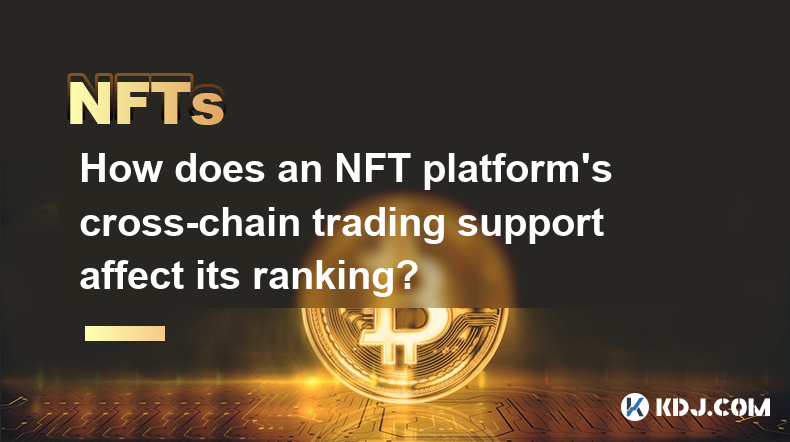
How does an NFT platform’s cross-chain trading support affect its ranking?
Apr 14,2025 at 04:49pm
The impact of an NFT platform's cross-chain trading support on its ranking is a multifaceted topic that delves into the technical capabilities, user experience, and market dynamics of the platform. Cross-chain trading refers to the ability of an NFT platform to facilitate the exchange of non-fungible tokens across different blockchain networks. This fea...
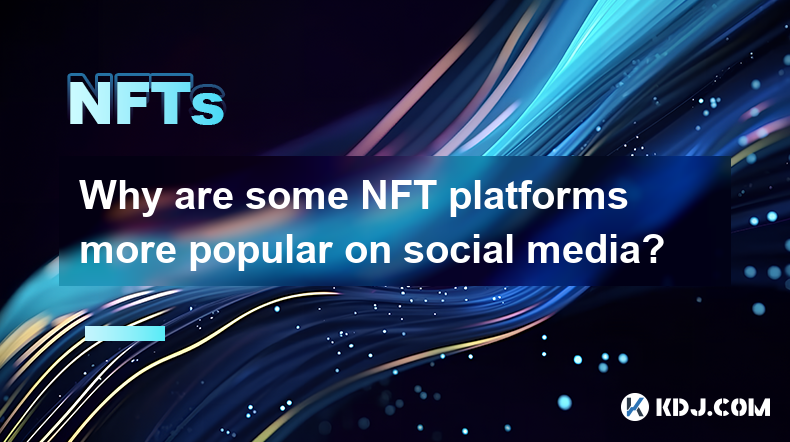
Why are some NFT platforms more popular on social media?
Apr 15,2025 at 01:00am
The popularity of NFT platforms on social media can be attributed to a variety of factors that influence their visibility, engagement, and overall appeal to users. Understanding these factors can provide insights into why certain platforms capture more attention and interaction on social media channels. User Experience and InterfaceUser experience (UX) ...
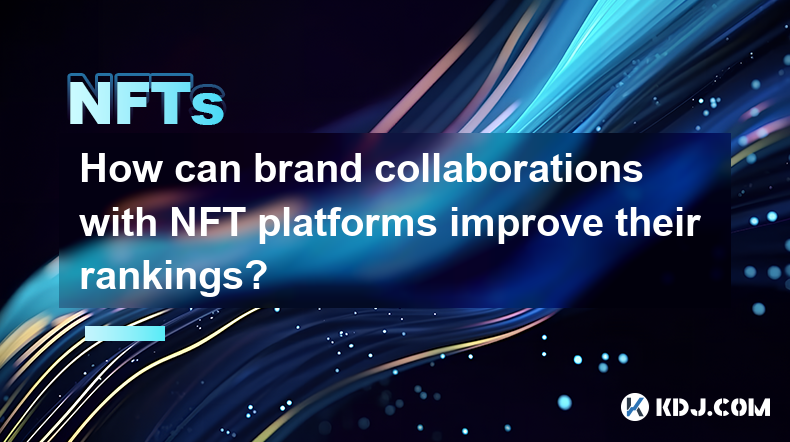
How can brand collaborations with NFT platforms improve their rankings?
Apr 15,2025 at 01:35am
Brand collaborations with NFT platforms have become increasingly popular in the cryptocurrency circle, offering a unique way to enhance visibility and rankings. By leveraging the strengths of both brands and NFT platforms, these collaborations can drive engagement, increase user base, and ultimately improve rankings on various metrics. In this article, ...

Which NFT platforms perform best in virtual land transactions?
Apr 14,2025 at 02:56pm
The NFT market has seen significant growth in virtual land transactions, with several platforms emerging as leaders in this space. Decentraland, The Sandbox, and Somnium Space are among the top performers, each offering unique features and opportunities for users. In this article, we will delve into these platforms, examining their strengths, transactio...
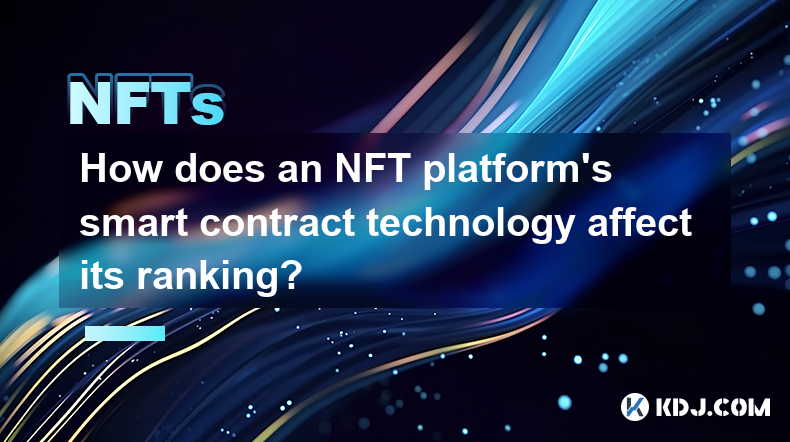
How does an NFT platform’s smart contract technology affect its ranking?
Apr 14,2025 at 11:42pm
Introduction to NFT Platforms and Smart ContractsThe world of Non-Fungible Tokens (NFTs) has seen explosive growth, with platforms like OpenSea, Rarible, and SuperRare becoming household names in the crypto space. At the heart of these platforms lies smart contract technology, which plays a crucial role in their operation and, consequently, their rankin...
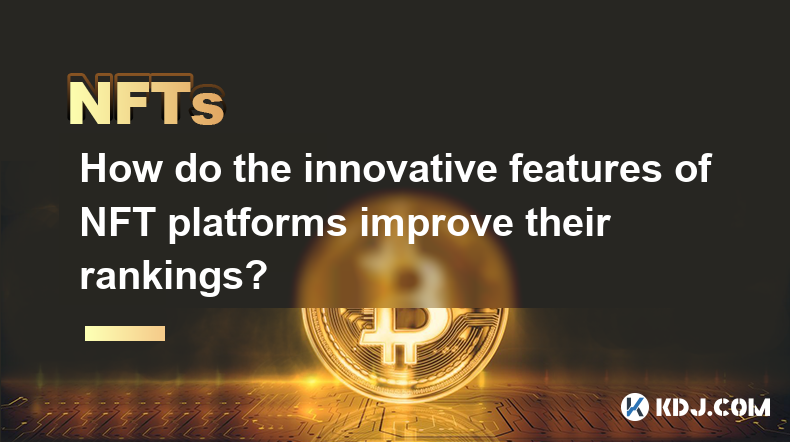
How do the innovative features of NFT platforms improve their rankings?
Apr 15,2025 at 12:42am
The world of Non-Fungible Tokens (NFTs) has seen rapid growth and evolution, leading to the emergence of numerous NFT platforms. These platforms vary widely in terms of features and functionality, which directly impacts their rankings and popularity within the cryptocurrency community. Innovative features play a crucial role in distinguishing top-perfor...

How does an NFT platform’s cross-chain trading support affect its ranking?
Apr 14,2025 at 04:49pm
The impact of an NFT platform's cross-chain trading support on its ranking is a multifaceted topic that delves into the technical capabilities, user experience, and market dynamics of the platform. Cross-chain trading refers to the ability of an NFT platform to facilitate the exchange of non-fungible tokens across different blockchain networks. This fea...

Why are some NFT platforms more popular on social media?
Apr 15,2025 at 01:00am
The popularity of NFT platforms on social media can be attributed to a variety of factors that influence their visibility, engagement, and overall appeal to users. Understanding these factors can provide insights into why certain platforms capture more attention and interaction on social media channels. User Experience and InterfaceUser experience (UX) ...

How can brand collaborations with NFT platforms improve their rankings?
Apr 15,2025 at 01:35am
Brand collaborations with NFT platforms have become increasingly popular in the cryptocurrency circle, offering a unique way to enhance visibility and rankings. By leveraging the strengths of both brands and NFT platforms, these collaborations can drive engagement, increase user base, and ultimately improve rankings on various metrics. In this article, ...

Which NFT platforms perform best in virtual land transactions?
Apr 14,2025 at 02:56pm
The NFT market has seen significant growth in virtual land transactions, with several platforms emerging as leaders in this space. Decentraland, The Sandbox, and Somnium Space are among the top performers, each offering unique features and opportunities for users. In this article, we will delve into these platforms, examining their strengths, transactio...

How does an NFT platform’s smart contract technology affect its ranking?
Apr 14,2025 at 11:42pm
Introduction to NFT Platforms and Smart ContractsThe world of Non-Fungible Tokens (NFTs) has seen explosive growth, with platforms like OpenSea, Rarible, and SuperRare becoming household names in the crypto space. At the heart of these platforms lies smart contract technology, which plays a crucial role in their operation and, consequently, their rankin...

How do the innovative features of NFT platforms improve their rankings?
Apr 15,2025 at 12:42am
The world of Non-Fungible Tokens (NFTs) has seen rapid growth and evolution, leading to the emergence of numerous NFT platforms. These platforms vary widely in terms of features and functionality, which directly impacts their rankings and popularity within the cryptocurrency community. Innovative features play a crucial role in distinguishing top-perfor...
See all articles























































































